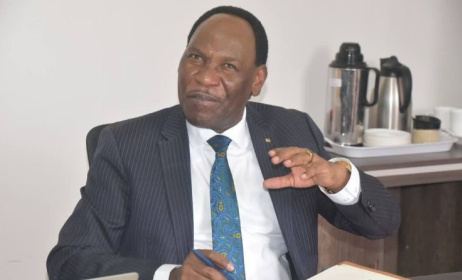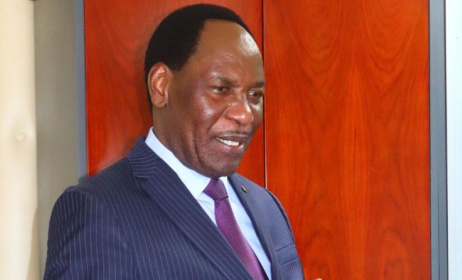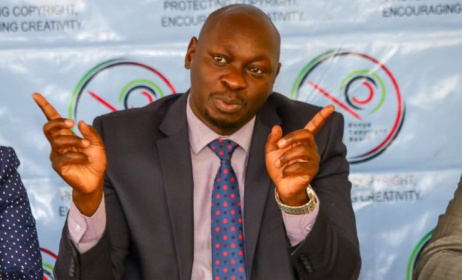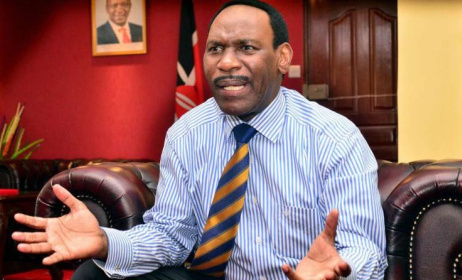Kenya court gives conflicting ruling on royalty collection
The Kisumu High Court in Kenya yesterday barred the Music Copyright Society of Kenya (MCSK) from collecting royalties, an order that is in direct conflict with a Kakamega High Court pronouncement dated 25 May 2017.
 Former MCSK CEO Maurice Okoth speaks during a press conference in 2016.
Former MCSK CEO Maurice Okoth speaks during a press conference in 2016.
The case was filed by the Kisumu Association of Bar Owners and Kisumu Green Garden Restaurant on 13 July. The Kenya Copyright Board (KECOBO) and the Music Publishers Association of Kenya (MPAKE) were enjoined in the Kisumu matter as interested parties. The two parties asked that the court stop the MCSK from harassing music users and businesses in the name of collecting royalties without a valid licence.
The Kisumu High Court judge quoted section 46(1) of the Copyright Act, which states that “no person or association of persons shall commence the business of a copyright collecting society except under or in accordance with a certificate of registration granted under this section".
“This ruling clearly shows that there are two conflicting court orders from the high court of Kenya,” an MCSK representative who did not want to be named told Music In Africa. “It was brought to the Kisumu judge’s attention that there is another order in Kakamega, which allowed the MCSK to continue with royalty collection temporarily until the case was heard on 28 September. She ignored and failed to address that fact. The MCSK will be seeking a stay of the orders pending an appeal of the ruling.”
The Kakamega case
On 31 May 2017, Kenyan musicians David Amunga and Laban Juma Toto sued KECOBO and the attorney-general in a case where the MCSK and MPAKE were listed as interested parties. The two wanted KECOBO barred from interfering with the MCSK’s mandate of collecting royalties as well as issuing statements on the matter. According to the two, KECOBO’s decision to decline MCSK’s application to renew its registration amounts to an unfair administrative action that contravenes articles 36, 40 and 47 of the Constitution.
The high court sitting in Kakamega went ahead and suspended its decision to deny the MCSK a licence to collect royalties on behalf of Kenyan artists. The court set 28 September as the hearing date of the application together with other applications on the same matter filed by other parties.
“This matter is certified as urgent, I hereby grant orders stopping the decision of KECOBO of approving the licence of MPAKE and revoking the licence of MCSK pending the hearing and determination of this case,” the judge said.
MCSK vs KECOBO
MCSK’s licence to collect royalties and represent more than 15 000 of its members expired on 31 December 2016. Its application to renew the licence was declined and communicated through a letter by KECOBO dated 17 February.
In March 2017, KECOBO issued a press release that announced the approval of a licence for a new collection body, MPAKE, which represents authors, composers, arrangers and publishers. KECOBO also renewed the licence of the Kenya Association of Music Producers (KAMP) and the Performers Rights Society of Kenya (PRISK). The bodies were given permission to operate from March 2017 to February 2018.
“The decision was made after the new association satisfied the requirements of Section 46 of the Copyright Act, 2001, and Regulation 15 and 16 of the Copyright Regulations 2004,” the statement from KECOBO reads .
However, the MCSK had failed to attach their last audited financial statements as well a list of its members and the amount of royalties collected and paid out.
Reactions from artists
In 2016, three members of the Elani music group accused the MCSK of giving the band meagre returns despite their songs receiving massive airplay throughout the year.
On 3 April 2017, a number of artists held protest at the deputy president’s office. According to them KECEBO had unfairly denied MCSK a licence. They said MPAKE was not eligible to represent artists since one of its directors, Maurice Okoth, was alleged to have been responsible for the collapse of the MCSK by swindling millions of Kenyan shillings during his time as CEO.
On 7 March, the Nairobi Musicians Association (NMA) released a statement backing KECOBO’s decision not to renew the MCSK’s licence until it tabled its audited financial statements and met all of KECOBO regulations.
MCSK goes to court
On 5 April, the MCSK filed an application that resulted in the court prohibiting KECOBO from interfering with the society’s collection of revenues on behalf of its members. It also ordered the board to stop issuing press releases about the MCSK. The case continues on 8 November.
“We filed for contempt of court against KECOBO on 25 May 2017 after they failed to obey the court’s order,” the MCSK representative said. “According to the court, they were banned from issuing press statements as well as commenting on matters concerning royalty collection. The high court judge set a hearing date for 25 July 2017 which was on Tuesday this week.
"KECOBO was not represented during the hearing, hence the court gave them 30 days to explain why contempt of court proceeding should not be commenced pending hearing and determination of the case on 18 September 2017 after which the court will give directions. We have placed a notice on the Daily Nation newspaper on the same."





























Comments
Log in or register to post comments